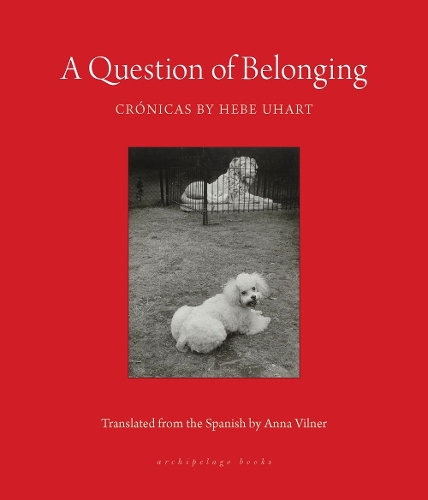
A Question of Belonging: Crnicas
(Paperback)
Publishing Details
A Question of Belonging: Crnicas
By (Author) Hebe Uhart
By (author) Anna Vilner
Archipelago Books
Archipelago Books
25th June 2024
28th May 2024
United States
Classifications
General
Fiction
863.6
Physical Properties
Paperback
241
Width 139mm, Height 165mm
369g
Description
"Sets the coordinates for a wisdom of her own." - Alejandra Costamagna 25 Cr nicas - uniquely Latin American short stories - from a master of the form, a star heralded alongside Samanta Schweblin and Mariana Enriquez for blending insight, honesty, and humor Uhart reinvigorates our desire to connect with other people, to love the world, to laugh in the face of bad intentions, and to look again, more closely- from lapwings, road-side pedicures, and the overheard conversations of nurses and their patients, to Goethe and the work of the Bolivian director Jorge Sanjines. "It was a year of great discovery for me, learning about these people and their homes," Hebe Uhart writes in the opening story of A Question of Belonging, a collection of texts that traverse Argentina, Paraguay, Brazil, Spain, and beyond. Discoveries sprout and flower throughout Uhart's oeuvre, but nowhere more so than in her cr nicas, Uhart's preferred method of storytelling by the end of her life. For Uhart, the cr nica meant going outside, meeting others. It also allowed the mingling of precise, factual reportage and the slanted, symbolic narrative power of literature. Here, Uhart opens the door on all kinds of people. We meet an eccentric priest who conducts experiments down by the riverside hoping to land on a cure for cancer; a queenly (read- beautiful and relentlessly indolent) teenage girl; a cacique of the Pueblo Naci n Charroa clan, who tells her of indigenous customs and histories. She writes with characteristic slyness. In the last lines of the title story, Uhart writes, "And I left, whistling softly." Wherever she may have gone, we are left with the wish we could follow alongside.
Author Bio
Born in 1936 in the outskirts of Buenos Aires, Hebe Uhart is one of the most original voices in the Spanish language. She is best known for her short stories exploring the lives of ordinary characters in small towns. Her Collected Stories won the Buenos Aires Bookfair Prize (2010), and she received Argentina's National Endowment of the Arts Prize (2015) for her trajectory as well as the Manuel Rojas Ibero-American Narrative Prize (2017). Her writing, which presents a characteristically criollo language, is identified with a quirky, understated syntax that constructs an odd perspective on the quotidian life in South America. Uhart died in 2018. Anna Vilner is a Russian-born American translator. She holds an MFA from the University of Arkansas and is a PhD student in Comparative Literature at the University of Texas-Austin. Her translations can be found in World Literature Today, The Massachusetts Review, Columbia Journal, and The Common.
